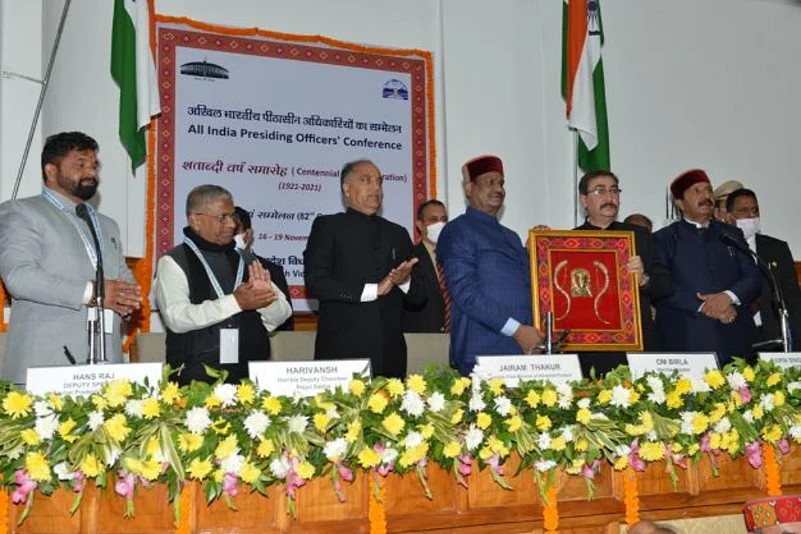On the opening day of the three-day 82nd All India Presiding Officers Conference, which began in Shimla on Wednesday, Himachal Pradesh's Leader of Opposition Mukesh Agnihotri asked for framing clear rules for assembly speakers against attending poll campaigns and party meetings.
The Conference was inaugurated by Prime Minister Narendra Modi via virtual mode.
Making his point, Agnihotri said there was a time when Speakers of the legislative assemblies used to stay away from political activities and never attended party leaders to uphold the dignity of their constitutional position.
But, now this practice is not being followed in its letter and spirit, Agnihotri said. He also added that the parliamentary practices across states are breaking up. Though there is no law banning their participation in party meetings or election campaigns, there are certain democratic norms and parliamentary practices on this which need to be reinforced or debated.
“There is no doubt that presiding officers or Speakers come from the political parties. But, it's the beauty of the democracy in India that Presiding officers have no party. They conduct the House proceedings as per parliamentary norms, practices and sometimes by their own conscience. There is a need to look into their roles. This is the need of the hour," Agnihotri underlined.
The anti-defection law, Agnihotri mentioned, also has several lacunas and such cases often go to the courts, bringing a bad name to the parliamentary democracy.
Besides issues relating to the role of the presiding officers and their powers, a discussion of the anti-defection law is also slated to take place during the Conference’s working sessions.
Agnihotri also referred to Shimla –the erstwhile Summer capital of the country, being instrumental in passing some landmark legislation when the Central Legislative assembly used to hold meetings in Shimla—the same British era Council Chamber which is the venue of the Conference.
Legendary parliamentarian Vithalbhai Patel, brother of Sardar Vallabhai Patel was the first Indian to be elected as presiding over of the Central Legislative Assembly. He defeated a British candidate in the same Council Chamber now housing the State assembly.
The historic bill to give the right to franchise to women in India was also passed in this House. The bill was moved by Moti Lal Nehru and seconded by Lala Lajpat Rai in 1925.
Another important decision was taken in this Council Chamber building where the resolution to set up the council secretariat of the central legislative Assembly (now Parliament secretariat) was passed on September 22, 1928. It was again moved by Moti Lal Nehru.
Speaking at the conference, Prime Minister Modi suggested introducing the concept of “one nation, one legislative portal” –a technology-driven platform to allow all the state assemblies and democratic entities to be connected with one another. He also spoke about fixing a few days in the calendar of the business for “healthy debates” in the Houses.
Rajya Sabha Deputy Chairman Harivansh laid stress on legislatures to adopt new technologies and prepare plans to use Artificial Intelligence as future technologies in the conduct of the legislative business.
Chief Minister Jai Ram Thakur traced the state assembly’s history and congratulated Himachal Pradesh for completing its 50 years. He further added that he hoped PM Modi will consider the issue of setting up a national parliamentary academy that had been proposed for the state.
There are around 273 delegates participating in the conference apart from top dignitaries like Lok Sabha Speaker Om Birla.
The first conference of the Presiding Officers was also held in Shimla in 1921—thus marking 100 years of the event.
















